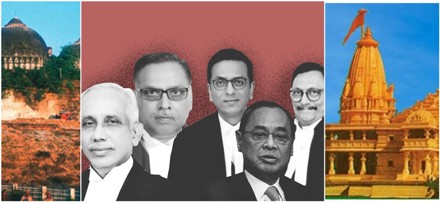

By Sunil Garodia
The Supreme Court announced on its website late on Friday evening that the verdict in the Ayodhya land dispute case would be delivered on Saturday, November 9, 2019, at 10.30 am. After the announcement, the UP administration, which had taken several steps to deal with the situation after the judgment, went into the emergency mode. Other states too have started to prepare for any eventuality arising out of mischief done by any party after the verdict.
In fact, in an unprecedented move, CJI Ranjan Gogoi, along with two other judges on the panel, CJI-designate Justice S A Bodbe and Justice Ashok Bhushan met the chief secretary and the DGP of UP in the chamber of the CJI on Friday to apprise themselves of the measures taken by the state to deal with the situation. The justices were informed about how the state was preparing to prevent mischief and deal with mischief-makers. Obviously, the justices were satisfied with the situation and that prompted them to take the decision to deliver the verdict on Saturday itself.
The justices know the import of their verdict. They know that passions are inflamed on both sides and despite pleas by everyone starting from the Prime Minister to maintain communal peace and harmony, just a small spark is enough to throw the situation out of control. They also know that despite all this, they have to deliver the verdict as per the proof submitted and arguments made before the court. Yet they reassured themselves by meeting the top state officers and would have issued directions for additional steps if they found anything lacking.
Ordinarily, a land dispute, even of this nature, would not have invited such unprecedented response from the government. But since it has turned into an issue of faith, with the Hindus believing and arguing that Lord Ram was born at the exact spot where a Ram Mandir existed prior to its demolition by Babar who constructed the Babri Masjid after razing the temple, there is a chance that there would be widespread protests if the verdict goes against the majority community.
It is India's test by fire. Today and in the days to come, if both the communities accept the Supreme Court verdict in a mature way by not celebrating excessively or protesting too much or in a violent manner, Indian society would signal its coming of age. Yet, if one or the other community does not accept the verdict and starts violent protests and if the administration is not able to stop them immediately, the social fabric will be shredded and there will be no rule of law in India.
As everyone connected with the case has been saying time and again that they will accept the verdict of the Supreme Court, it is time now to walk the talk.











